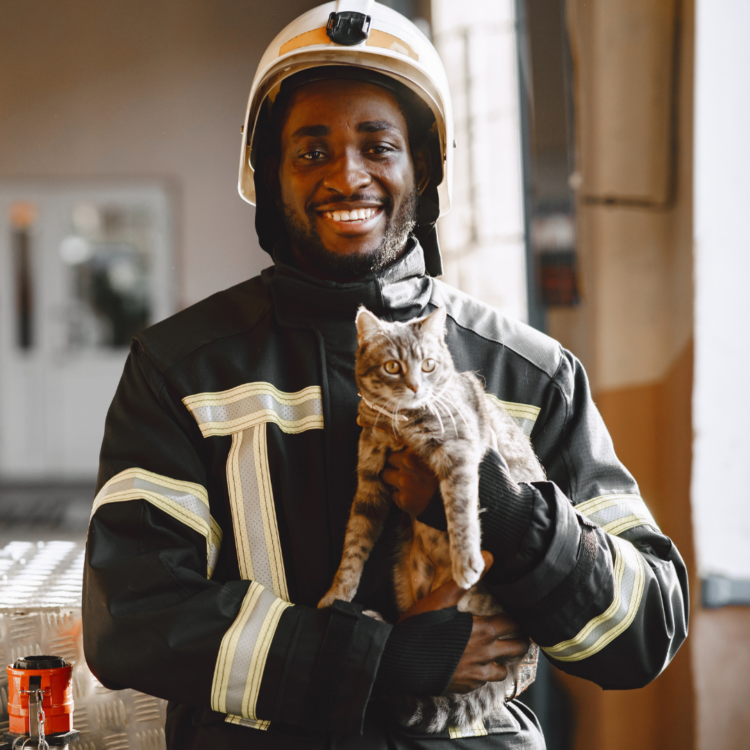I once worked for a news station as an assignment editor. In doing this job, I listened to police scanners and covered house fires all the time. It was always so sad and devastating to hear the details about what happened to these people and families and a lot of times, pets.
Hearing these stories got me thinking – if I were to ever experience a house fire, how would I handle saving my two cats? My thoughts would spiral. Would I just get them outside as quickly as possible? What if I wasn’t home? It’s not a pleasant thought, I know, but having a plan is important!
Today is National Pet Fire Safety Day, so I’m going to share some tips on how you can easily be prepared in a situation like this.
Evacuation Plan Inclusion
When planning and practicing your own evacuation plan, the Red Cross advises to make sure you include your pets too. If your pets don’t already come when called, be sure to train them to do so. Your pets should also have their own disaster kit with food, water and any medications they may take. It’s also a good idea to prepare a place for them to stay in the event of any emergency, including a house fire. No matter what, the Red Cross notes that the best thing you can do to save your pet is simply to evacuate them.
Pet Alert Window Cling

Image courtesy: Chewy.com
One of the easiest things you can do to prepare that will help a firefighter save your pets, whether you would be home at the time of a fire or not, is to have a pet alert window cling that tells how many pets you have in the home. According to the Red Cross, this critical information can help firefighters save valuable time when locating your pets in your home. They also note to make sure the number of pets written on the cling stays updated. Your local fire department should have these clings on hand to give out but in the event that they wouldn’t, there are other options you can purchase online like these ones from Chewy. Place one on each side of your home or in every apartment window so they aren’t missed.
Location of Pets in Your Home While You’re Gone

Another tip that the Red Cross gives is to keep your pets near entrances or easily accessible areas when you’re not at home. Keeping dogs in kennels and wearing their collar with a leash nearby will be able to aid firefighters in getting them out of the home as quickly as possible. While this may be more difficult to prepare for if you have a cat that roams your home, you can still close off hard-to-reach places that your cat would be able to access so they don’t get stuck in a crawl space that rescuers can’t get to.
Prevention

Even better than preparing for disaster is preventing it to begin with. According to the National Fire Protection Association about 1,000 fires a year are caused by pets in the home. One way to help make sure your pets don’t cause accidental destruction is to be very careful with candles in your home. Always be sure to stay nearby when you have a candle burning and to blow it out when you leave the area or go to bed at night. This way, your curious kitty doesn’t have the chance to push the candle off a table or get anything flammable near the open flame. If you love to burn candles, great alternatives include flameless candles or candle warmers to avoid an open flame.
Another recommendation from the Red Cross for fire prevention is to remove your stove knobs when you leave your house so dogs and cats are unable to bump them on when you’re not there. Stovetops are actually the number one cause of accidental fires started by pets according to North East Animal Hospital.

We all know that cats and dogs alike tend to enjoy chewing on a wide array of things and one of the most dangerous things like to chew is electrical cords. This is the perfect combination to start a fire in your home. Instead of trying to keep your pets away from the cords, it’s much easier to keep the cords away from your pets. Tie up cords and cover them so your pet’s teeth don’t find their way to them.
All of these tips can help give you some piece of mind in the event of a house fire and in knowing you are actively avoiding the fires to being with. Don’t let your fear of a disaster get in the way of preventing or preparing for one, especially when it comes to those who can’t plan ahead themselves. Your pets will thank you for it.






